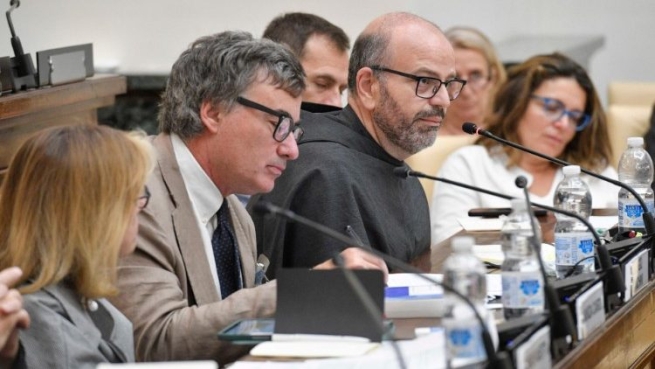After Pope Francis’ message was released for World Communications Day last month, a conference entitled “The algorithm at the service of humankind. Communicating in the age of artificial intelligence” took place in the Vatican on Thursday, 27 June, gathering experts in the fields of AI and communications to compare ideas and discuss concerns on the issue.
Within the Casina Pio IV walls, the conference addressed questions such as those posed by Dr Paolo Ruffini, Prefect of the Dicastery for Communication, as he gave the opening remarks. He asked: “Artificial intelligence translates everything into calculation, but can we reduce everything to a statistical probability? How can we protect professionals and workers in the media from the arrival of AI and maintain the right to inform and be informed on the basis of truth, freedom and responsibility? How can we make large platforms that invest in generative AI interoperable so that they do not reduce humans to a reservoir of data to be exploited?”
Welcoming the participants along with Dr Paolo Ruffini was Fr Lucio Ruiz, Secretary of the Dicastery for Communication, who highlighted some of what Pope Francis has said concerning the theme of Artificial Intelligence. He emphasized that the Pope’s interventions on Artificial Intelligence demonstrate the Church’s “intuition” in walking with humanity through its culture and historical changes. He explained that this was the case 500 years ago when the first Vatican printing press was created - shortly after Gutenberg’s discovery. Likewise, it was proved with the construction of Vatican Radio by the inventor of the radio himself, Guglielmo Marconi, in 1931. And another example, he added, is the creation of the vatican.va portal in 1994, when the web had only just begun to appear on people’s computers.
The next person to speak was Father Paolo Benanti, professor of ethics and bioethics at the Pontifical Gregorian University, president of the AI Commission for Information, and member of the United Nations AI Committee. He opened the first of two panel discussions on “The Ethics of Algorithms and the Challenges for Communication.” Fr Benanti began by highlighting the primary essence of computers, which is to perform calculations. Benanti recalled how the invention of transistors, made available by the United States to its allies after the successes of World War II, changed reality. Early computer prototypes contributed to the discovery of the atomic bomb and the decoding of secret codes used by Nazi Germany. From that centralised vision of technology, and through the revolution led by Silicon Valley pioneers in the 1970s, he noted that we eventually arrived at a “personal” and intimate computation, first through PCs and then smartphones. With ChatGPT and its implementation in Apple and Microsoft phone interfaces, he emphasised that we still do not know how much of the computational power will be personal and how much will be centralised in the cloud. Therefore, he stressed that “regulation is necessary”, as the European Union has done, to manage artificial intelligence in the same way traffic laws have been established for cars.
Also speaking at the conference was Nunzia Ciardi, Deputy Director General of the National Cybersecurity Agency. She said that Artificial Intelligence is not an impressive technological leap in itself. What makes its implementation something that will have a decisive anthropological impact on reality, she explained, is the fact that it relies on an enormous amount of data collected “brutally” over the decades by companies through free services or applications that have become essential for us. Ciardi highlighted other aspects, such as the use of the English language to train algorithms – with all the values and cultural expressions that one language carries compared to another – and the risk of increasingly struggling to decode complex messages, which can be dangerous in a democracy.
Professor Mario Rasetti, Emeritus of Theoretical Physics at the Polytechnic University of Turin and President of the Scientific Board of CENTAI, also spoke at the conference. He commented that “knowledge is becoming private property,” recounting the experience of OpenAI, which started as a non-profit organisation of scientists and was acquired by Microsoft for $10 billion. Rasetti added that we must make Artificial Intelligence a science with rigorous definitions because, in its current state, it presents itself as a probabilistic tool, which can hardly measure intelligence, truth, and causality.
By Michele Raviart and Francesca Merlo
Source: Vatican News


